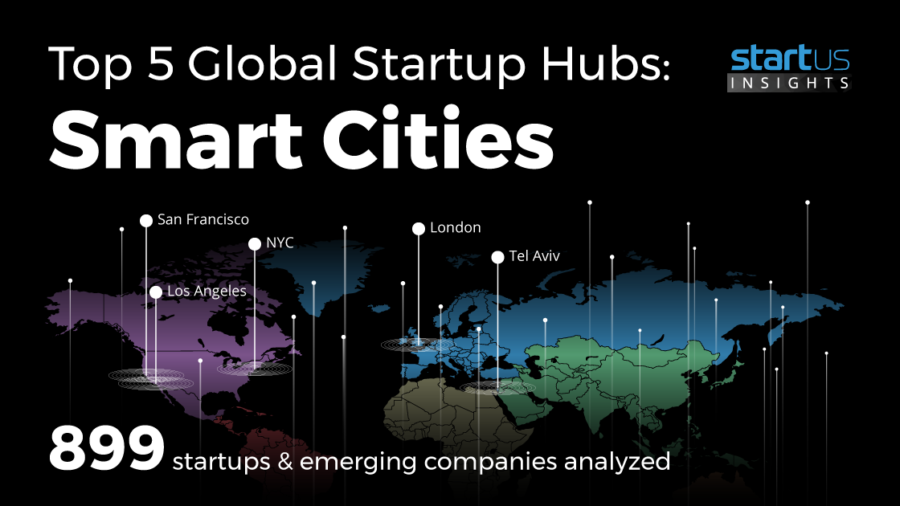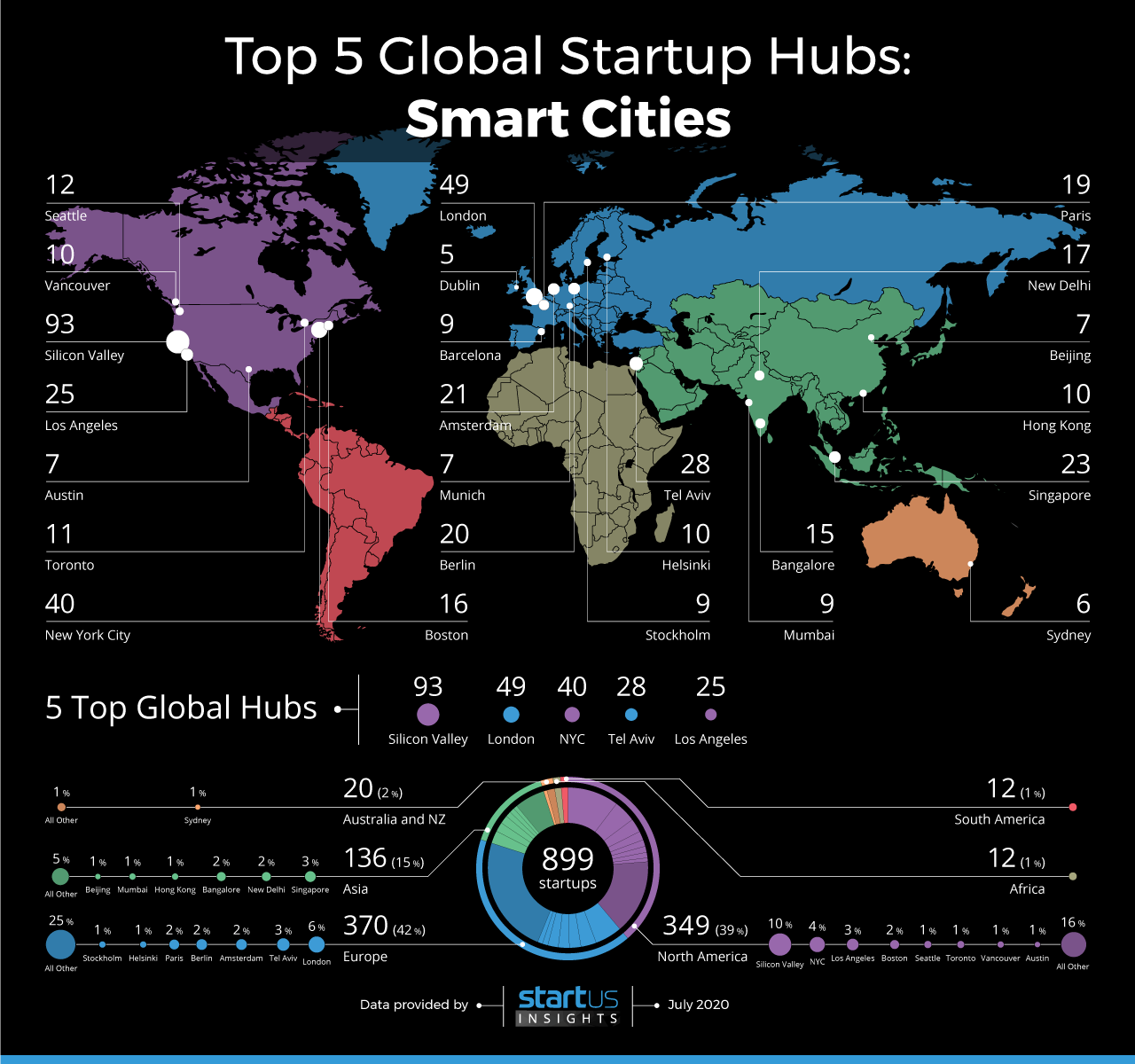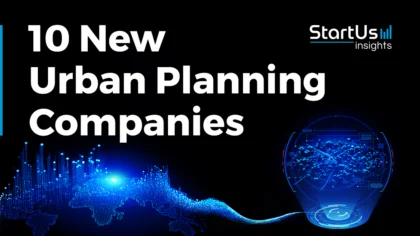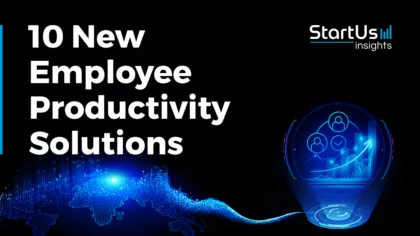As the population living in urban areas continues to grow at an exponential rate, it further stresses already overburdened cities. Smart cities aim to cater to the growing urban population, while improving on sustainability, safety, and mobility, to name a few challenges. These initiatives are backed by new technologies such as artificial intelligence (AI) and the Internet of Things (IoT). These technologies use sensors and other means of data collection to gather large amounts of public data that is then available for researchers and startups to work with. Smart city startups offer smarter solutions for urban challenges such as traffic congestion, public and cybersecurity threats, energy management, and e-governance. Due to their nature, smart city solutions often encourage public participation and government-industry collaborations.
Top 5 Global Startup Hubs: Smart Cities
Using our StartUs Insights Platform, we analyzed the geographic distribution of global activity in the smart city industry. We identified 36 regional hubs* that observe high activity in developing technology-driven solutions across the industry like traffic management systems, curbside management, and smart buildings, to name a few.
Within the hubs, we analyzed a sample of 899 startups* employing technology-driven solutions to advance smart cities. Silicon Valley, London, New York City, Tel Aviv, and Los Angeles are home to 235 startups and account for 26% of global activity in smart cities. Let us have a look at some of the innovative solutions from these 5 top hubs.
Based on our analysis of a sample of 899 emerging solutions, North America alone accounts for 39% of global activity in the smart city sector. Several large smart city hubs in the US are cities that are known for their strong tech ecosystems.
European smart city hubs in London, Tel Aviv, Amsterdam, Berlin, etc. account for 42 % of global activity. These hubs are using smart city technologies to address urban challenges resulting from increasing congestion. Emerging Asian hubs in Singapore, New Delhi, and Bangalore lead the region’s activity in the sector.
1. Silicon Valley: 93 Startups
Silicon Valley has a huge advantage in developing smart city solutions as it houses a large number of startups working on underlying technologies such as AI and IoT. The cities in the region are promoting smart city startups to make public spaces safe, inclusive, and sustainable. For instance, Palo Alto’s traffic lights are interconnected in a single network to allow dynamic and remote signaling for better traffic flow.
Hayden AI is a Berkeley-based startup that develops an AI-powered platform for smart and safe city applications. It develops the Inx31 camera that uses the Artificial Intelligence of Things (AioT) to identify and report on bus-only late violations. The Safe Sense platform collects and sends real-time alerts that are easily accessed by city officials on a browser-based portal. Besides collecting data for enforcement of traffic laws, the platform also enables other smart city applications such as parking management, city asset tracking, identifying road and sidewalk hazards, etc.
2. London: 49 Startups
London was one of the first cities to open its data for innovators with the London Datastore. The city is converting its iconic telephone boxes into WiFi hotspots and kiosks. With a network of 15,000 detectors, the SCOOT platform collects information on traffic flows to reduce traffic delays and congestion. The Smarter London Together roadmap aims to encourage more user-designed services, new applications for city data, and improve city-wide collaboration.
London-based startup Skyscape offers a rooftop analytics solution. It collects data from a large number of government sources and combines it with 3D photogrammetry, satellite imagery, and LiDAR data to identify rooftop potential. These include solutions such as drone deliveries, urban agriculture, and telecoms and enhances the asset utilization of real estate portfolios to allow urban planners to meet local challenges efficiently.
3. New York City: 40 Startups
New York City is a leading example of how local administrations can take a proactive role in making cities smarter. It reduced greenhouse gas emissions from government buildings by retrofitting light-emitting diodes (LED) under the Accelerated Conservation and Efficiency (ACE) program. The NYC Department of Environmental Protection installs automatic meter reading (AMR) units equipped with low-power radio devices in buildings to gain insights on water consumption. Smart city initiatives by other city departments facilitate smart waste management and monitor air quality to address the issue of air pollution.
Based out of New York City, Actuate develops software that detects public safety threats. Its cloud-based AI turns existing cameras into smart cameras that detect firearms and intruders with very high accuracy. Unlike facial recognition systems, the solution analyzes objects without storing any customer data, thereby eliminating compliance and privacy concerns. Moreover, it eliminates any algorithmic or human bias that may privilege one group over others.
4. Tel Aviv: 28 Startups
Tel Aviv is a smart city that focuses on making its residents’ lives convenient. The DigiTel Residents Club, an initiative with over 200.000 registered users, sends personalized live updates to the residents, such as road closures, public surveys, and local events. The municipality has set up sensors, cameras, and Bluetooth devices throughout the city to understand the traffic flow for better planning. Other smart city initiatives in Tel Aviv focus on smart energy, security, and shared mobility.
Since smart city solutions often employ IoT, any security threats to the assets can halt wide-scale operations. Tel Aviv-based startup iXDen offers security solutions for IoT assets in smart buildings and smart cities. It secures IoT operations from a range of threats, including altered sensor measurements, data injection and manipulation, and hardware or software tampering. iXDen’s solution finds applications in building management systems, utilities, and IoT payments.
5. Los Angeles: 25 Startups
Los Angeles is promoting smart city solutions to address urban functionality and climate change-related challenges. The Los Angeles Open Data platform lets users share their data, which then the city shares publicly to encourage transparency and accountability, as well as to enable startups to develop solutions. For instance, the Los Angeles Cyber Lab makes the city’s cyber intelligence insights freely available to local businesses.
QuayChain is a Los Angeles-based startup that builds digital infrastructure for industrial locations to create smart industrial hubs. It combines private Long-Term Evolution (LTE) wireless with the Industrial Internet of Things (IIoT) to enable high-speed and low-latency solutions in the harshest industrial locations. The startup’s solutions apply to ports, airports, public agencies, utilities, rail yards, banking, etc.
What’s next?
As urban centers become more populated and more regions get urbanized, the challenge of cities around the world is to meet the residents’ needs in a sustainable manner. Startups and governments will work together to tackle urban challenges. With the maturation of underlying technologies and the growth of open data, smart city solutions will improve the lives of more citizens globally than ever before.
*We define a hub as the regional geographic center of activity for this topic. It covers the center point with a radius of 100km. We define startups as those founded after 2015.







